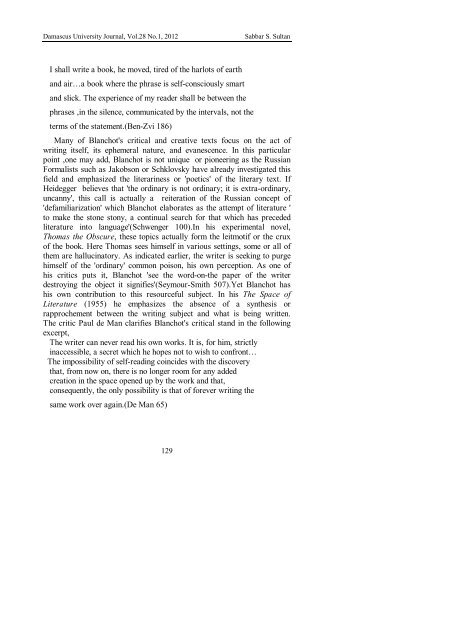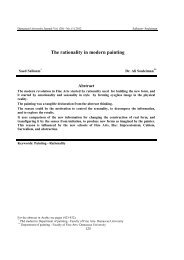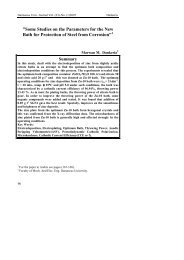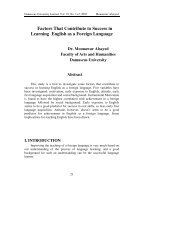<strong>Types</strong> <strong>of</strong> <strong>Obscurity</strong> <strong>in</strong> <strong>Thomas</strong> <strong>Hardy's</strong> <strong>Jude</strong> <strong>the</strong> <strong>Obscure</strong> <strong>and</strong> Maurice Blanchot's …,exercise an undeniable attraction…any attempt to <strong>in</strong>terpretBlanchot <strong>in</strong> a language o<strong>the</strong>r than his own seems to beimpeded by an unspoken taboo. The alternative that rema<strong>in</strong>sopen seems to be a choice between silent admiration(stupor)or imitation(paraphrase, plagiarism).(Todorov 55)Many <strong>of</strong> Blanchot's critical writ<strong>in</strong>gs have been absorbed <strong>and</strong>assimilated by <strong>the</strong> great 20 th century French ,American <strong>and</strong> English criticssuch as Bar<strong>the</strong>s, Derrida, Foucault, De Man, Hartman, Kristeva…etc.Some <strong>of</strong> <strong>the</strong>m are ready to acknowledge <strong>the</strong>ir debt to him <strong>in</strong> hisoverrid<strong>in</strong>g <strong>in</strong>fluence while o<strong>the</strong>rs simply negate that altoge<strong>the</strong>r. Rol<strong>and</strong>Bar<strong>the</strong>s can only say <strong>the</strong> follow<strong>in</strong>g regard<strong>in</strong>g Blanchot's effect on his owncritical discourse <strong>and</strong> practices, particularly <strong>in</strong> stress<strong>in</strong>g that 'writ<strong>in</strong>gaccentuates not objects, but <strong>the</strong>ir absence, <strong>and</strong> <strong>the</strong> Nietzscheanexploration <strong>of</strong> <strong>the</strong> impossibility, <strong>of</strong> <strong>the</strong> noth<strong>in</strong>gness <strong>of</strong> existence'(Bar<strong>the</strong>s99). Moreover, Blanchot is an early figure <strong>in</strong> po<strong>in</strong>t<strong>in</strong>g out <strong>the</strong> <strong>in</strong>adequacy<strong>of</strong> <strong>the</strong> language. He has drawn our attention <strong>in</strong> his critical writ<strong>in</strong>gs, novels<strong>and</strong> ecrits, to <strong>the</strong> ever-grow<strong>in</strong>g chasm between symbol <strong>and</strong> object,signifier <strong>and</strong> signified, expression <strong>and</strong> th<strong>in</strong>g. Literature for Blanchot is 'not a series <strong>of</strong> works but a nascent language, a collection <strong>of</strong> seriesnegat<strong>in</strong>g reality, a void, <strong>and</strong> absence'(Bree 157).Needless to say, sucharguments lay <strong>the</strong> foundation for <strong>the</strong> postulates <strong>of</strong> critics like Derrida,Foucault <strong>and</strong> Bar<strong>the</strong>s <strong>in</strong> <strong>the</strong>ir recurrent emphasis on <strong>the</strong> ephemerality <strong>of</strong><strong>the</strong> language <strong>and</strong> <strong>the</strong> absence <strong>of</strong> <strong>the</strong> material object. The literaryexperience is seen as emphasiz<strong>in</strong>g <strong>the</strong> divorce between <strong>the</strong> aes<strong>the</strong>ticworld <strong>of</strong> art <strong>and</strong> <strong>the</strong> objective reality. Creative writ<strong>in</strong>gs <strong>and</strong> critical ones(<strong>and</strong> his <strong>Thomas</strong> <strong>the</strong> <strong>Obscure</strong> be<strong>in</strong>g one <strong>of</strong> <strong>the</strong>m) have been occupied bythis paradox. Shakespeare's The Tempest(1611) ,for example, revolvesaround <strong>the</strong> verbal <strong>in</strong>sufficiency <strong>and</strong> <strong>in</strong>competence <strong>of</strong> <strong>the</strong> l<strong>in</strong>guisticmedium so that <strong>the</strong> audience is forced to 'confront <strong>the</strong> abyss <strong>of</strong> l<strong>in</strong>guisticsigns'(Walter 61). Beckett's trilogy (Molloy,Malone Dies,<strong>and</strong> TheUnnamable)(1953)explores this problematic situation <strong>in</strong> detail. Beckett'sdream does not end here. In an unpublished novel, he tells us <strong>of</strong> his desire<strong>of</strong> solv<strong>in</strong>g this situation,128
Damascus University Journal, Vol.28 No.1, 2012Sabbar S. SultanI shall write a book, he moved, tired <strong>of</strong> <strong>the</strong> harlots <strong>of</strong> earth<strong>and</strong> air…a book where <strong>the</strong> phrase is self-consciously smart<strong>and</strong> slick. The experience <strong>of</strong> my reader shall be between <strong>the</strong>phrases ,<strong>in</strong> <strong>the</strong> silence, communicated by <strong>the</strong> <strong>in</strong>tervals, not <strong>the</strong>terms <strong>of</strong> <strong>the</strong> statement.(Ben-Zvi 186)Many <strong>of</strong> Blanchot's critical <strong>and</strong> creative texts focus on <strong>the</strong> act <strong>of</strong>writ<strong>in</strong>g itself, its ephemeral nature, <strong>and</strong> evanescence. In this particularpo<strong>in</strong>t ,one may add, Blanchot is not unique or pioneer<strong>in</strong>g as <strong>the</strong> RussianFormalists such as Jakobson or Schklovsky have already <strong>in</strong>vestigated thisfield <strong>and</strong> emphasized <strong>the</strong> literar<strong>in</strong>ess or 'poetics' <strong>of</strong> <strong>the</strong> literary text. IfHeidegger believes that '<strong>the</strong> ord<strong>in</strong>ary is not ord<strong>in</strong>ary; it is extra-ord<strong>in</strong>ary,uncanny', this call is actually a reiteration <strong>of</strong> <strong>the</strong> Russian concept <strong>of</strong>'defamiliarization' which Blanchot elaborates as <strong>the</strong> attempt <strong>of</strong> literature 'to make <strong>the</strong> stone stony, a cont<strong>in</strong>ual search for that which has precededliterature <strong>in</strong>to language'(Schwenger 100).In his experimental novel,<strong>Thomas</strong> <strong>the</strong> <strong>Obscure</strong>, <strong>the</strong>se topics actually form <strong>the</strong> leitmotif or <strong>the</strong> crux<strong>of</strong> <strong>the</strong> book. Here <strong>Thomas</strong> sees himself <strong>in</strong> various sett<strong>in</strong>gs, some or all <strong>of</strong><strong>the</strong>m are halluc<strong>in</strong>atory. As <strong>in</strong>dicated earlier, <strong>the</strong> writer is seek<strong>in</strong>g to purgehimself <strong>of</strong> <strong>the</strong> 'ord<strong>in</strong>ary' common poison, his own perception. As one <strong>of</strong>his critics puts it, Blanchot 'see <strong>the</strong> word-on-<strong>the</strong> paper <strong>of</strong> <strong>the</strong> writerdestroy<strong>in</strong>g <strong>the</strong> object it signifies'(Seymour-Smith 507).Yet Blanchot hashis own contribution to this resourceful subject. In his The Space <strong>of</strong>Literature (1955) he emphasizes <strong>the</strong> absence <strong>of</strong> a syn<strong>the</strong>sis orrapprochement between <strong>the</strong> writ<strong>in</strong>g subject <strong>and</strong> what is be<strong>in</strong>g written.The critic Paul de Man clarifies Blanchot's critical st<strong>and</strong> <strong>in</strong> <strong>the</strong> follow<strong>in</strong>gexcerpt,The writer can never read his own works. It is, for him, strictly<strong>in</strong>accessible, a secret which he hopes not to wish to confront…The impossibility <strong>of</strong> self-read<strong>in</strong>g co<strong>in</strong>cides with <strong>the</strong> discoverythat, from now on, <strong>the</strong>re is no longer room for any addedcreation <strong>in</strong> <strong>the</strong> space opened up by <strong>the</strong> work <strong>and</strong> that,consequently, <strong>the</strong> only possibility is that <strong>of</strong> forever writ<strong>in</strong>g <strong>the</strong>same work over aga<strong>in</strong>.(De Man 65)129
- Page 1 and 2: Damascus University Journal, Vol.28
- Page 3 and 4: Damascus University Journal, Vol.28
- Page 5 and 6: Damascus University Journal, Vol.28
- Page 7 and 8: Damascus University Journal, Vol.28
- Page 9 and 10: Damascus University Journal, Vol.28
- Page 11 and 12: Damascus University Journal, Vol.28
- Page 13 and 14: Damascus University Journal, Vol.28
- Page 15: Damascus University Journal, Vol.28
- Page 19 and 20: Damascus University Journal, Vol.28
- Page 21 and 22: Damascus University Journal, Vol.28
- Page 23 and 24: Damascus University Journal, Vol.28
- Page 25 and 26: Damascus University Journal, Vol.28
- Page 27 and 28: Damascus University Journal, Vol.28
- Page 29 and 30: Damascus University Journal, Vol.28
- Page 31 and 32: Damascus University Journal, Vol.28
- Page 33 and 34: Damascus University Journal, Vol.28
- Page 35 and 36: Damascus University Journal, Vol.28
- Page 37 and 38: Damascus University Journal, Vol.28
















